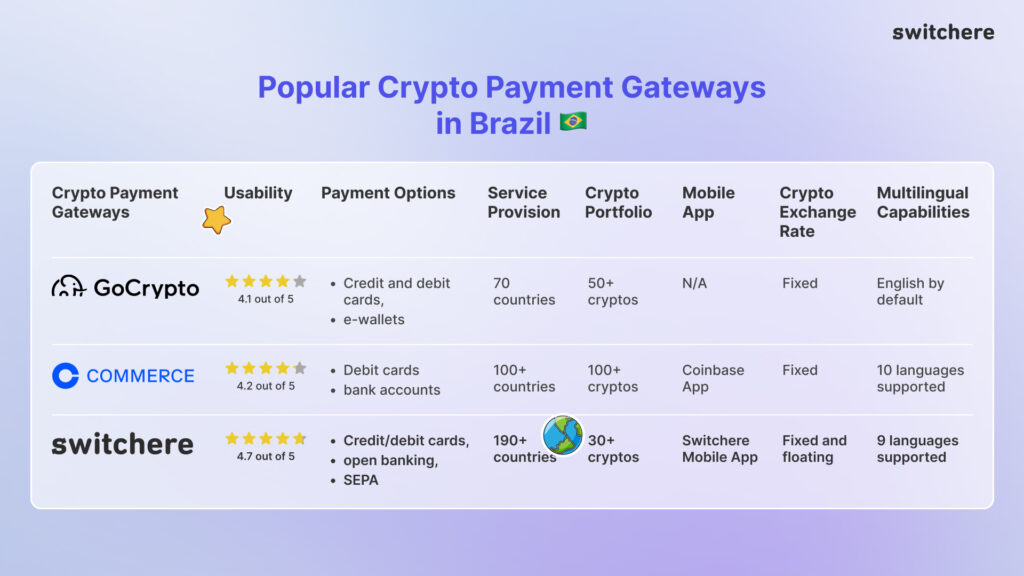Brazil, a vibrant and dynamic economic powerhouse in South America, has witnessed a surge in the adoption of cryptocurrency in recent years. As business entities seek innovative payment options to cater to evolving client needs, crypto payment gateways have turned out to be a compelling option. This analysis delves into the current status of cryptocurrency regulation in Brazil, examining the existing judicial framework, the state of cryptocurrencies and crypto payments, and the licensing and registration norms for business entities and cryptocurrency exchange service providers.
Regulatory Administration
Brazil has taken a progressive approach towards cryptocurrency regulation, recognizing the potential benefits and risks connected with digital assets. The regulatory field is predominantly ruled by the Brazilian Central Bank (BCB) and the Securities and Exchange Commission (CVM). The BCB, in particular, has issued guidelines that categorize cryptocurrencies as non-financial products, emphasizing their use as a means of payment rather than a financial asset.
Current Status of Cryptocurrencies in Brazil
Cryptocurrencies, notably Bitcoin and altcoins, have gained traction in Brazil, with a growing number of persons and business entities engaging in crypto-related activities. Virtual currencies are widely accepted as a medium of exchange by numerous merchants, contributing to their increasing mainstream acceptance.
Crypto Payments in Brazil
A plethora of businesses in Brazil integrate digital assets into their payment options across various sectors. This trend is driven by the decentralized nature of cryptocurrencies, enabling faster and more cost-effective cross-border transactions compared to traditional payment methods. Despite the growth, challenges such as price volatility and regulatory uncertainties persist, influencing the widespread adoption of crypto payments.
Licensing and Registration Requirements
Businesses and cryptocurrency exchange firms in Brazil are subject to concrete licensing and registration rules to guarantee standardized adherence to AML/KYC and CTF regulations. The BCB and CVM play crucial roles in overseeing these requirements, namely deploying internationally recognized AML and CTF procedures and conducting due diligence on customers.
Advantages of Crypto Payment Gateways
Global TXs
Crypto payment gateways facilitate international transactions without the complications associated with traditional banking systems. This can be a game-changer for Brazilian businesses engaged in global trade, as it eliminates currency conversion fees and reduces TX times.
Reduced TX Costs
Cryptocurrency TXs often come with lower fees compared to traditional payment methods. Business entities can benefit from cost savings, especially when dealing with high-volume transactions, making crypto payment gateways an attractive option for enterprises of all sizes.
Financial Inclusion
Brazil has a significant unbanked population. Crypto payment gateways can bridge the financial inclusion gap by providing an alternative payment method that does not rely on traditional banking infrastructure. This opens up new market perspectives and opportunities for business entities to reach a broader customer base.
Popular Crypto Payment Gateways in Brazil
As the crypto ecosystem matures, the prospects for business entities in Brazil adopting crypto payment gateways are promising and appealing. Here is a comparative list of popular crypto payment gateways operating in Brazil.

GoCrypto
GoCrypto is a Slovenian-based fintech payment facilitator that renders a wide spectrum of fiat and virtual currency payment solutions. It offers universal payment infrastructure tools via crypto payment plugins, POS terminals, cash register integration and customized white label solutions. The firm has been in business from 2018 onwards, and it is best suited for accepting virtual currencies at local or online stores with competitive TX processing fees.
Coinbase Commerce
Going further, Coinbase Commerce is a trendy on-chain crypto payment solution developed by Californian fintech giant Coinbase. This branded solution allows seamless tools for businesses to accept crypto online with simplified onboarding, real-time conversions and reduced commissions for its partners.
Switchere
The only company that stands out in this comparative table is Switchere. Fundamentally, Switchere is a Lithuania-based fintech company that specializes in rendering crypto exchange services following the B2B and B2C business models. Regular persons and business entities can freely buy and exchange crypto on the go via licensed and regulated virtual currency service provider Switchere.
Concerning business partnership relations, the company offers a rich selection of B2B collaboration, particularly accepting crypto payments, fiat on-ramps, token listing, and NFT Checkout. Simple and smart integration via API and widget SDK allows seamless and customizable payment infrastructure solutions with full technical support.
Conclusion
Overall, Brazil’s cryptocurrency regulation framework reflects a balanced approach that acknowledges the potential benefits of digital assets while addressing associated risks. The increasing acceptance of cryptocurrencies for payments and the presence of a regulatory framework contribute to the development of a more robust and secure crypto ecosystem in Brazil. As the market continues to evolve, ongoing collaboration between regulators, businesses, and the crypto community will be crucial to navigating challenges and fostering responsible innovation in the space.

Leave a Reply